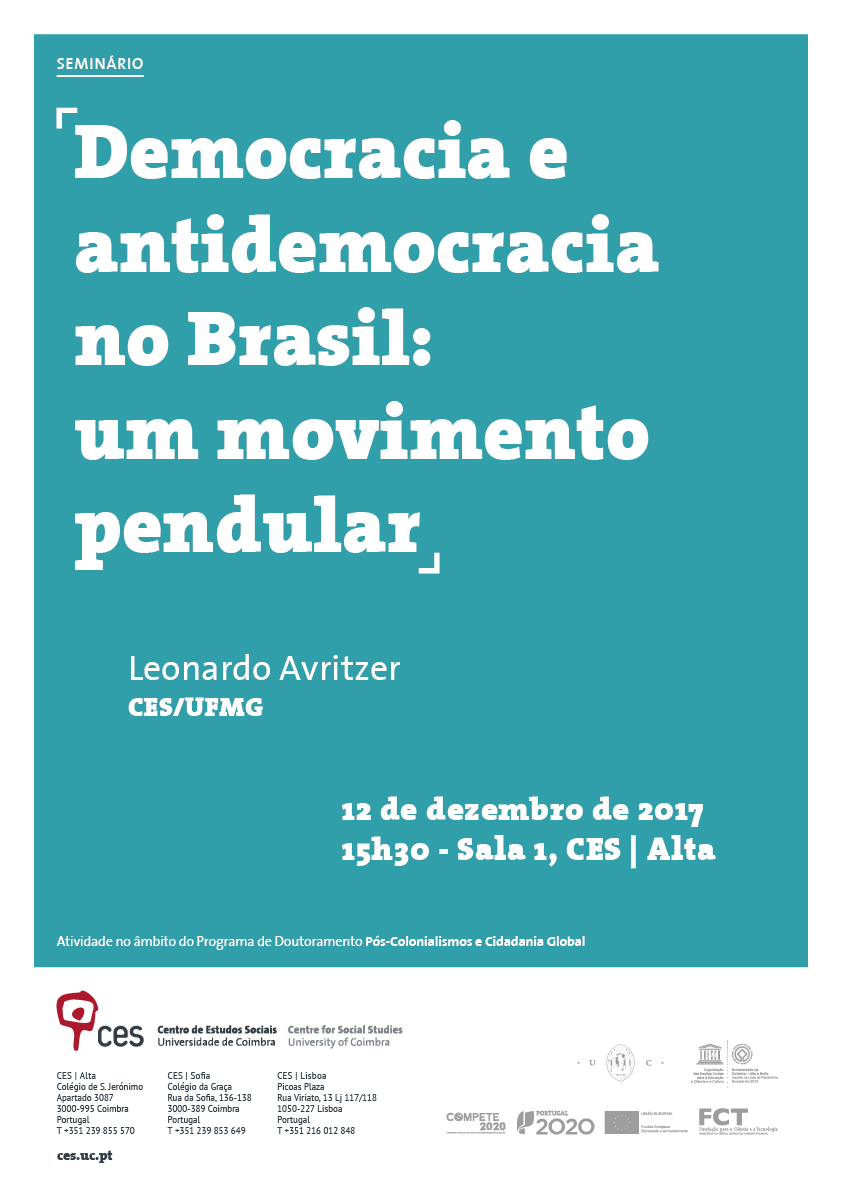Seminar
Democracy and anti-democracy in Brazil: a pendular movement
Leonardo Avritzer (CES/UFMG)
December 12, 2017, 15h30
Room 1, CES | Alta
Abstract
There is a paradox in the evolution of democracy in Brazil that needs to be approached analytically. By 2013, all short-term indicators pointed towards the consolidation and strengthening of the country’s democracy. In the nearly four years between June 2013 and mid-2017, there was a complete reversal of conditions with the formation of a "malaise" in democracy. This "malaise" began with important protest demonstrations, still in 2013, for better public policies that could strengthen a set of actions, which hardly contributed to the strengthening of democracy. Among them, it would be worth highlighting the public harassment of members of the political system and the focus of society's attention on issues related to corruption. In the year 2015, strongly conservative protest demonstrations in Brazil reinforced the mood of strong intolerance among different social groups. In 2016, the impeachment of former President Dilma Rousseff based on extremely week allegations because the idea of a fiscal pedal did not constitute a differential of behaviour of the president in relation to other presidents or governors. Other occurrences of the same year were the removal of the president of the Chamber of Deputies, his subsequent arrest and an attempt to remove the president of the Senate. Lastly, the Brazilian population witnessed major conflicts between the judiciary and the National Congress in an attempt to reverse the law passed in the chamber against abuses of authority. All institutional elements are complemented by a set of extra-institutional elements, such as confrontations in social networks between left and right, the new system of repression of popular movements and renewed patterns of police violence. All these elements point towards a greater need for a more careful analysis of Brazilian democracy and its stage of consolidation.
It is in this sense that a theoretical, analytical and methodological question is posed: how to understand the regressions by which Brazilian democracy passed between 2013 and 2017? Are they merely a skirmish in a long process of democratic construction, as happened in the United States during McCarthyism or in Italy during the period of confrontation of the Red Brigades? In my view, we have evidence of very large setbacks to consider these changes only a skid or a “detour” over a long political journey. The evidence is linked to the strong violations of the guarantees of the 1988 Constitution and to the interinstitutional dispute that began with the Dilma Rousseff government crisis but which has reached still worrying proportions with the Temer government crisis in which the executive branch and the Attorney General's Office face each other openly. Finally, we have a level of intolerance in society that is unprecedented: artists and politicians being verbally assaulted on the streets and in social networks; discourses of tolerance and diversity being reversed by proposals for legislation on the family or by advocacy by media sectors of an anti-rights and anti-gender equality agenda. All these setbacks lead us to suppose that the elements that motivated the optimistic analysis of the last two decades on democracy in Brazil need to be put in perspective and replaced by a pendular view of the process of democracy building in Brazil.
Bio note
Leonardo Avritzer is a full professor of the department of political science at the Federal University of Minas Gerais. He was president of the Brazilian Association of Political Science 2012-2016. CES Associate Researcher, he has published broadly, including books published in 2016 on the Brazilian reality, namely "Os Impasses da Democracia no Brasil"; "Un examen de la participación democrática en Brasil (1990-2014)" and "O papel do pluralismo na formação e consolidação da ciência política no Brasil".


